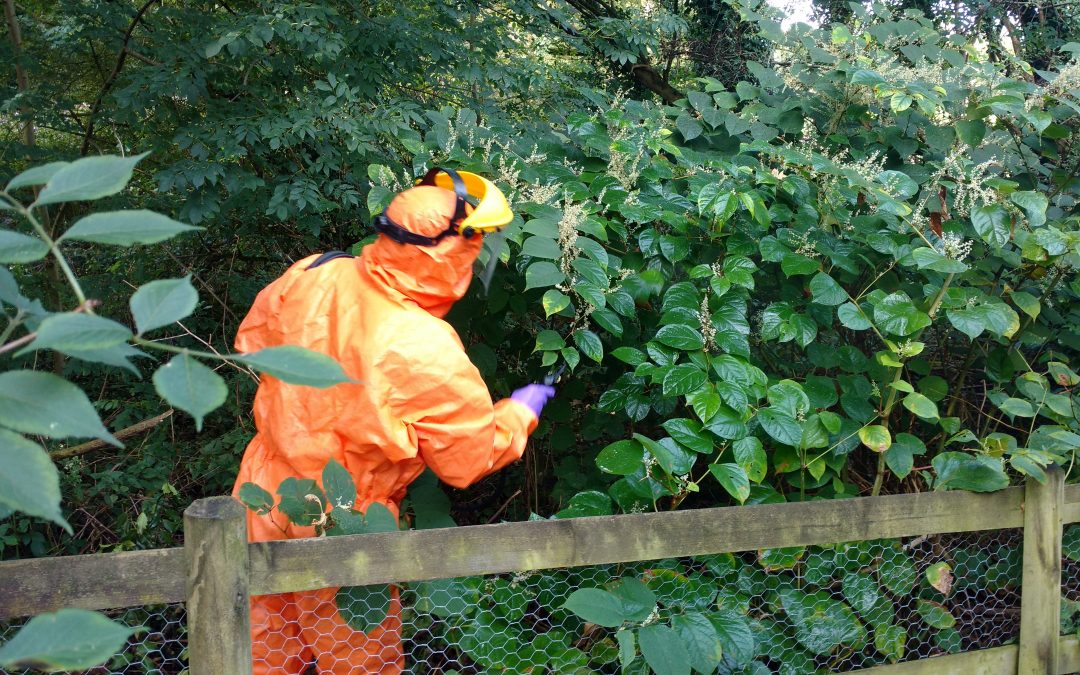How Does Glyphosate Kill Japanese Knotweed?
Japanese Knotweed, an invasive plant species, has rapidly spread across the United States and other nations, posing a significant threat to ecosystems and infrastructure. To combat this menace, herbicides are popular, with glyphosate being widely used. This article dissects how glyphosate eliminates Japanese Knotweed and the factors that determine its efficacy.
How Does Glyphosate Kill Japanese Knotweed?
Glyphosate is a systemic herbicide absorbed by the plant and transported throughout its system. It works by inhibiting the plant’s ability to produce certain amino acids essential for growth. The plant cannot make proteins without these amino acids and eventually dies.
The plant absorbs glyphosate through its leaves and travels to the root system. As it moves through the plant, it interferes with the enzymes that produce the essential amino acids, causing the plant to wither and die. The process can take several weeks, and the plant will gradually turn brown and wilt.
Factors Affecting Glyphosate’s Effectiveness:
Several factors can impact the effectiveness of glyphosate in killing Japanese Knotweed. These include:
- Timing: Glyphosate is most effective during the plant’s active growth period, typically in late summer or early winter. Applying the herbicide too early or too late in the growing season can reduce its effectiveness.
- Concentration: The concentration of glyphosate in the herbicide solution can also impact its effectiveness. A higher concentration can improve the herbicide’s ability to kill the plant and increase the risk of damage to nearby plants. Dormancy can also result from using too much concentration.
- Environmental Conditions: The weather and environmental conditions at the time of application can also impact the herbicide’s effectiveness. Warm, overcast weather with little to no wind is ideal for application, as it allows the herbicide to be absorbed and transported throughout the plant.
FAQs:
Q. Is glyphosate safe to use around humans and animals? A. Glyphosate is generally considered safe when used according to the manufacturer’s instructions. However, it can be harmful if ingested, and precautions should be taken when using the herbicide around people and animals.
Q. Will glyphosate kill other plants besides Japanese Knotweed? A. Glyphosate can harm other plants if it comes into contact with them. It is essential to use caution when applying the herbicide and to avoid spraying it near desirable plants.
Is glyphosate dangerous to human health?
Glyphosate, a widely used herbicide, has sparked debate and controversy due to potential health and environmental risks. It’s crucial to be aware of these risks, which include carcinogenicity, ecological toxicity, developmental and reproductive toxicity, endocrine disruption, and the development of glyphosate-resistant weeds.
- Carcinogenicity: Glyphosate has been classified as a probable human carcinogen by the International Agency for Research on Cancer (IARC). Several studies have linked glyphosate exposure to an increased risk of non-Hodgkin’s lymphoma and other types of cancer.
- Environmental toxicity: Glyphosate can be toxic to non-target organisms, such as bees and other pollinators, and may harm aquatic life. It can also persist in the environment and potentially contaminate soil and water.
- Developmental and reproductive toxicity: Some studies have suggested that glyphosate exposure may be linked to developmental and reproductive problems, such as congenital disabilities, low birth weight, and infertility.
- Endocrine disruption: Glyphosate may interfere with the normal functioning of hormones in the body, potentially leading to a range of health problems, including obesity, diabetes, and cancer.
- Resistance: Overuse of glyphosate has led to the development of glyphosate-resistant weeds, which require higher and more frequent applications of the herbicide to control, contributing to further environmental and health risks.
It is important to note that scientists and regulatory agencies are still debating the extent of the risks associated with glyphosate, and more research is needed to fully understand its potential impacts on human health and the environment.
We are aware of the potential dangers.
When using glyphosate, we prioritise safety. We wear personal protective equipment (PPE) to minimise health risks, including gloves, long-sleeved clothing, eye protection, and respirators. We follow the manufacturer’s instructions and safety guidelines and correctly dispose of any contaminated PPE and materials. These measures are in place to ensure your safety and prevent further exposure.
Glyphosate is an effective herbicide for controlling invasive species such as Japanese Knotweed. Its systemic action works by inhibiting the plant’s ability to produce essential amino acids, causing it to wither and die. The timing of application, concentration of the herbicide, and environmental conditions can impact its effectiveness, and care should be taken to avoid damage to desirable plants. When used correctly, glyphosate can be valuable in controlling Japanese Knotweed and other invasive plant species. It’s always recommended that a professional company like Japanese knotweed deal with the problem for you.
